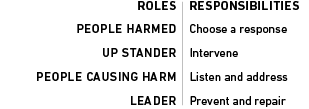Making Radical Candor
Just Work
Shortly after I published Radical Candor a former colleague, “Michelle,” asked me to give a book talk at her company. I was excited to do it. I liked and respected Michelle enormously and had enjoyed working with her for many years. She was also one of too few Black women CEOs. I was happy for her success. It seemed like a sign the world was moving in a good direction.
When I finished giving my presentation, Michelle pulled me aside. “I’m excited to roll out Radical Candor here, Kim. I think it’s going to help me build the kind of innovative culture I want. But I gotta tell you. It’s a lot harder for me to roll it out than it is for you. As soon as I give anyone even the most gentle, compassionate criticism, I get slimed with the angry Black woman stereotype.”
I knew this was true. I had four revelations at the same time.
Create a work environment that makes it possible for everyone to be radically candid!
First, I realized that I had failed to be the kind of colleague I imagine myself to be. I had not even noticed the extent to which Michelle had to show up unfailingly cheerful and pleasant in every meeting we’d ever been in together. Even though she had what to be ticked off about at work from time to time, as we all do. As a White woman, I had never considered the toll it must take on her as a Black woman to have to hide her natural human responses. I had failed to be an upstander. I had pretended everything was fine when it clearly wasn’t.
Next, I realized that not only had I been in denial about the things that were happening to Michelle as a Black woman in the workplace, I had also been in denial a about the things that had happened to me as a White woman in the workplace. I had never wanted to think of myself as a victim, so I pretended that a whole host of things were not happening to me that were in fact happening. Kind of hard for the author of a book about candor to admit, but there it was.
Of course, even less than wanting to think of myself as a victim did I want to think of myself as a culprit. The third thing I realized was that I’d been most deeply in denial about the ways I’d been unfair to the people who I worked with. Ibram X Kendi said that denial is the heartbeat of racism. It’s also the heartbeat of sexism, homophobia, and all the other forms of intolerance that make collaboration and respect so difficult to achieve.
And last but not least, I realized that as a leader, I had not created the kind of environments in which everyone could just work. Just in the “just get sh*t done” sense of the word, and just in the “justice” or “fairness” sense of the word, too.
While it was painful to come to grips with these failures in the moment, the feedback was illuminating. It helped me understand the different roles I played at different moments in my career, and the different responsibilities I had in each role.
I wrote Just Work to help make sure I did better in the future than I’d done in the past. I hope what I learned will help you as well. As I wrote, I learned how to replace my denial with a willingness to notice how things really are, so I could try to fix problems instead of pretending they didn’t exist. What a relief to get those elephants out of the rooms where I worked! I wrote it to explore what each of us can do to create the kind of fair, reasonable working environment in which we can all do the best work of our lives and at least enjoy working together. Ideally, even love working together. Love in the true sense of collegiality, not the HR disaster, marriage destroying sense of the word we read so much about today…


